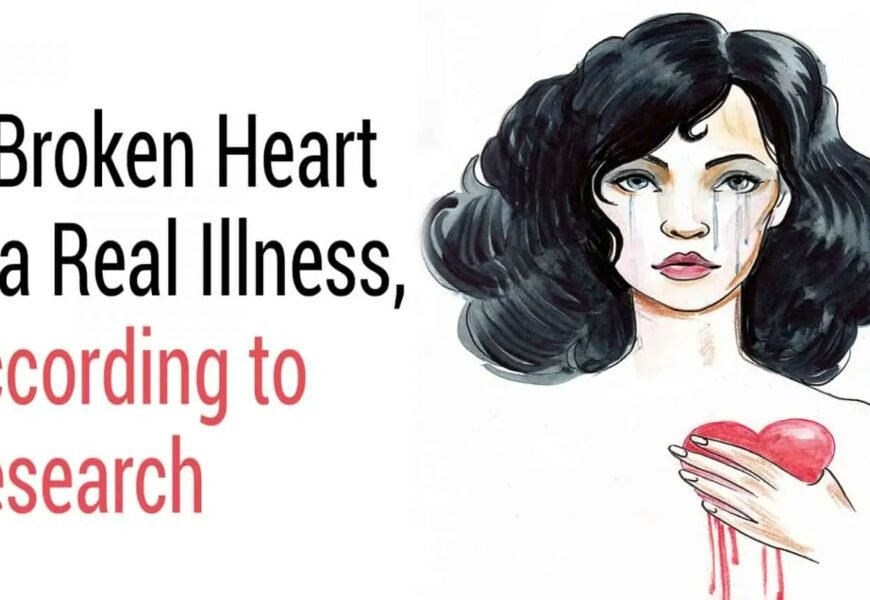1. Emotional Pain Can Manifest as Physical Symptoms
When people talk about having a “broken heart,” it often sounds like a poetic metaphor. However, research shows that emotional heartbreak can cause very real physical pain. The stress and sadness from losing a loved one, going through a breakup, or facing betrayal can activate the same brain regions that process physical pain. This is why heartbreak doesn’t just feel sad—it actually hurts in a physical sense. People report chest tightness, shortness of breath, loss of appetite, and fatigue when their hearts are broken. Over time, these symptoms can create a cycle where emotional distress worsens physical health, leading to an overall decline in well-being. Studies using brain imaging have found that the brain struggles to separate emotional loss from physical injury. This connection proves that a broken heart is more than just a saying; it is a condition with real biological consequences. The brain, body, and emotions are deeply linked, and when love is lost, the entire system reacts.
2. Broken Heart Syndrome Is a Medically Recognized Condition
Medical science has identified a condition called “Takotsubo cardiomyopathy,” often referred to as “broken heart syndrome.” This temporary heart condition occurs when extreme emotional stress—such as grief, shock, or heartbreak—causes the heart’s left ventricle to weaken. Symptoms mimic those of a heart attack, including chest pain, irregular heartbeat, and shortness of breath. What makes this condition striking is that it can appear in individuals who have perfectly healthy arteries. In other words, the cause isn’t clogged vessels, but intense stress hormones, especially adrenaline, flooding the body. While the condition is usually temporary, it can be life-threatening if not managed properly. Doctors now recognize that emotions have enough power to impact cardiovascular health directly. The discovery of broken heart syndrome has changed how medicine views grief, proving that emotional trauma can trigger physical illness in ways previously underestimated.
3. Stress Hormones Can Damage the Heart
When heartbreak strikes, the body produces stress hormones like adrenaline and cortisol in unusually high amounts. While small bursts of these hormones are normal for survival, long-term or overwhelming stress can be dangerous. In cases of heartbreak, the surge of stress hormones overwhelms the heart, leading to temporary dysfunction. This is why individuals experiencing deep grief or loss often feel their hearts racing, pounding, or skipping beats. Research has shown that these stress responses can strain the cardiovascular system, disrupt normal heart rhythms, and even cause heart muscle weakness. Over time, this hormonal imbalance may contribute to high blood pressure, insomnia, and weakened immunity. The heart doesn’t simply process emotions metaphorically—it actually absorbs the chemical consequences of stress. This biological reality shows why heartbreak should be taken seriously, as the impact extends beyond emotional suffering to measurable health risks.
4. Heartbreak Weakens the Immune System
Another overlooked effect of heartbreak is its ability to weaken the immune system. Emotional distress alters the body’s hormonal balance, increasing cortisol levels while suppressing immune function. This is why grieving individuals often fall sick more easily, catching colds, infections, or struggling to recover from illnesses. The connection between the mind and immune system is well established in medical science. Stress and sadness lower the production of infection-fighting white blood cells, leaving the body more vulnerable to disease. Prolonged grief or heartbreak creates a cycle of emotional and physical weakness, making it harder for the person to heal. Many studies show that people experiencing deep loss or separation are more likely to face chronic health problems later in life. This weakening of the immune system emphasizes that a broken heart isn’t just emotional suffering—it’s a biological illness with real-world health implications.
5. Sleep Disturbances Amplify Heartbreak’s Damage
One of the first things people notice during heartbreak is disrupted sleep. They may find it hard to fall asleep, wake up in the middle of the night, or experience restless, shallow rest. The lack of sleep then worsens emotional regulation, making sadness, stress, and anger feel even stronger the next day. Research shows that people with heartbreak-induced insomnia also face increased risks of cardiovascular issues, diabetes, and mental health struggles. The cycle is cruel: heartbreak causes sleeplessness, and sleeplessness intensifies heartbreak. Over time, the exhaustion affects the body’s ability to repair itself, weakens immunity, and damages heart health. Brain studies have revealed that sleep-deprived individuals experience more activity in brain regions tied to emotional distress. This means that heartbreak not only robs a person of rest but also prolongs emotional suffering by impairing recovery. Thus, sleep disturbances are one of the strongest ways a broken heart transforms into a real illness.
6. The Brain Processes Heartbreak Like Physical Pain
Heartbreak activates the brain in ways that are surprisingly similar to actual physical injuries. Neuroimaging studies show that when people experience rejection or loss, the same regions of the brain that process physical pain—the anterior cingulate cortex and the insula—light up. This means the brain literally cannot distinguish between a broken heart and a physical wound. That’s why people often say heartbreak “hurts.” It’s not an exaggeration; it’s a neurological reality. This also explains why painkillers, in some cases, can slightly reduce the emotional sting of heartbreak, though only temporarily. The overlap of physical and emotional pain makes heartbreak one of the most draining human experiences, as the mind and body interpret it as an injury. In essence, losing someone you love doesn’t just feel like being wounded—it truly registers in the brain as if you were. This discovery reinforces that heartbreak is not just a mental state but a physiological event that requires healing like any other injury.
7. Appetite Loss and Digestive Issues Are Common
Many people going through heartbreak notice dramatic changes in appetite. Some lose interest in food entirely, while others may overeat in an attempt to comfort themselves. Stress hormones disrupt the digestive system, leading to nausea, stomach pain, bloating, or indigestion. Research shows that the gut and brain are closely connected through the vagus nerve, meaning emotional distress directly impacts digestion. This is why heartbreak can lead to weight loss, weight gain, or chronic digestive discomfort. Long-term appetite issues also result in nutritional deficiencies, which weaken both the body and the mind. When someone is grieving, their body diverts energy away from digestion and towards survival, further suppressing appetite. This makes heartbreak a condition that not only affects the heart but also the stomach, leading to an overall decline in physical wellness. By studying appetite changes, scientists continue to prove that emotional loss disrupts entire bodily systems, not just moods.
8. Heartbreak Increases Risk of Depression
While sadness is expected after a breakup or loss, prolonged heartbreak can trigger clinical depression. The body’s stress response, lack of sleep, and hormonal imbalance create fertile ground for mental health struggles. People with broken hearts often feel hopeless, fatigued, and detached from life. Research confirms that heartbreak-related depression can last for months or even years if not addressed. In severe cases, it increases the risk of other mental health conditions like anxiety and panic disorders. This shows how deeply the mind and heart are connected. A person who is emotionally shattered isn’t just “sad”; they may be fighting a full mental illness with biological roots. Left untreated, depression can damage the brain’s ability to regulate emotions, making recovery harder. Thus, heartbreak is not just temporary sadness—it is a psychological and biological event that can evolve into a lasting illness requiring care and treatment.
9. Broken Hearts Can Trigger Real Heart Attacks
While “broken heart syndrome” is usually temporary, research shows that intense grief can also trigger actual heart attacks. Studies reveal that the risk of a heart attack is highest in the first 24–48 hours after losing a loved one. The surge of adrenaline, high blood pressure, and irregular heart rhythms can push the cardiovascular system past its limits. In individuals with existing heart conditions, heartbreak becomes especially dangerous. This is why widows and widowers often face higher risks of dying soon after their partners. Scientists call this phenomenon the “widowhood effect,” and it proves how devastating emotional loss can be on the body. It is not merely emotional suffering—it can be fatal. This reality underscores the seriousness of heartbreak as a real illness, not just an emotional struggle, and highlights the need for better medical and emotional care for grieving individuals.
10. Heartbreak Alters Brain Chemistry
When someone is in love, the brain floods with feel-good chemicals like dopamine and oxytocin. These chemicals create joy, bonding, and comfort. When love is lost, the sudden absence of these chemicals creates withdrawal symptoms similar to drug addiction. People may experience anxiety, restlessness, and even physical pain as the brain craves the missing chemicals. Research has compared heartbreak to withdrawal from substances like cocaine, as both involve sudden deprivation of dopamine and reward pathways. This is why people often obsess over their ex-partners, replay memories, or struggle to move on—the brain is chemically addicted to the connection. The imbalance in brain chemistry explains why heartbreak feels overwhelming, uncontrollable, and consuming. It also demonstrates why healing from heartbreak takes time, as the brain slowly rewires itself to function without the constant supply of bonding hormones.
11. Heartbreak Can Lead to Risky Behaviors
After experiencing heartbreak, many individuals engage in risky behaviors such as excessive drinking, overeating, or reckless decision-making. Research suggests that this happens because the brain’s reward system is destabilized. In the absence of love-related dopamine, the brain seeks new ways to fill the void. Unfortunately, many of these behaviors damage physical and mental health even further. For example, heavy alcohol use can worsen depression and harm the heart, while overeating can increase the risk of diabetes and obesity. This cycle of unhealthy coping proves how heartbreak doesn’t just hurt emotionally—it pushes people towards choices that amplify illness. Understanding this link helps explain why self-destructive patterns often emerge during periods of grief. It also reinforces the idea that heartbreak should be treated with compassion and medical attention, as it can spiral into wider health issues when ignored.
12. The Mind-Body Connection Makes Heartbreak Dangerous
One of the most fascinating aspects of heartbreak is how deeply the mind and body interact. Emotional trauma triggers physical illness, and physical illness worsens emotional pain. For example, someone grieving may struggle with headaches or body aches caused by muscle tension. These physical symptoms then increase stress and sadness, creating a vicious cycle. Research in psychosomatic medicine shows that unresolved heartbreak can lead to chronic conditions like fibromyalgia, high blood pressure, and heart disease. The connection between the emotional and physical body is undeniable, and heartbreak sits at the center of this relationship. Unlike simple sadness, heartbreak attacks the body holistically, leaving no system untouched. This mind-body interaction is why scientists now classify heartbreak as more than a metaphor—it is a whole-body illness that requires recognition and treatment.
13. Women and Men Experience Heartbreak Differently
Studies reveal that women and men often experience heartbreak differently at both emotional and physical levels. Women are more likely to experience broken heart syndrome, possibly due to differences in hormones and stress responses. Men, on the other hand, may be less likely to seek emotional support, which can lead to unaddressed health issues. Men also face higher risks of sudden heart problems following emotional trauma. This difference shows how biology and social expectations combine to shape how people experience heartbreak. Women may outwardly express emotions and seek comfort, which helps in recovery, while men often internalize pain, which worsens health outcomes. These differences highlight the importance of tailored care and awareness when treating heartbreak as an illness. Understanding gender-specific responses can help prevent severe health consequences and encourage both men and women to take heartbreak more seriously as a medical condition.
14. Social Isolation Intensifies Heartbreak’s Effects
When people experience heartbreak, they often withdraw socially, avoiding friends and family. While this may feel natural, isolation worsens both emotional and physical health. Research shows that loneliness increases the risk of cardiovascular disease, depression, and even early death. Social support plays a vital role in recovery from grief, as conversations, companionship, and shared experiences help regulate stress hormones and improve immune function. Without social connection, the body struggles to repair itself, prolonging the illness of heartbreak. Scientists now understand that humans are biologically wired for connection, and when that bond is broken, the absence of social support makes the damage worse. In this way, heartbreak is not just about losing love but also about losing the protective shield that relationships and social networks provide. Isolation turns heartbreak into an illness that can spiral into long-term suffering.
15. Heartbreak Affects Memory and Focus
Another surprising effect of heartbreak is its impact on cognitive function. Many people notice they become forgetful, distracted, or unable to concentrate after emotional loss. Research shows that stress hormones impair the hippocampus, the brain region responsible for memory and learning. This makes it harder to focus at work, study, or make decisions. The brain becomes consumed by obsessive thoughts about the loss, leaving little room for new information. Over time, this cognitive fog can lead to decreased productivity and self-esteem, worsening emotional pain. This effect is so significant that psychologists now compare heartbreak to trauma, as both impair cognitive abilities. Heartbreak doesn’t just hurt emotionally—it can change the way the brain functions daily. By affecting concentration, it reinforces the idea that heartbreak is not a minor setback but a legitimate illness that affects overall brain health.
16. Grief Alters the Body’s Inflammatory Response
Heartbreak activates inflammation throughout the body. Research has shown that grief and emotional stress increase inflammatory markers like cytokines in the bloodstream. While inflammation is the body’s way of fighting injury, chronic inflammation is harmful. It is linked to diseases such as arthritis, diabetes, and heart disease. People experiencing heartbreak often complain of unexplained aches, pains, and fatigue—all signs of inflammation. The stress response triggers the immune system to go into overdrive, harming rather than healing the body. This means heartbreak not only weakens the immune system but also actively fuels inflammation that damages organs and tissues. Doctors are beginning to understand how emotional trauma can leave lasting scars on physical health through inflammation. This biological evidence further proves that heartbreak is not just emotional—it is an illness that leaves its mark on the entire body.
17. Heartbreak Can Lead to Substance Dependence
As people try to cope with the pain of heartbreak, some turn to substances such as alcohol, nicotine, or even drugs. This self-medication is an attempt to numb the overwhelming sadness and stress. However, substance dependence only worsens the illness by damaging the heart, liver, and brain. Research confirms that those experiencing grief are at higher risk of addiction because of the brain’s craving for dopamine and comfort. The danger is that what begins as occasional use can quickly spiral into long-term dependence. This risk demonstrates how heartbreak creates a ripple effect, leading to other illnesses if left untreated. Addiction becomes another form of heartbreak’s destructive power, proving once again that it is not a small matter but a health crisis with wide-reaching consequences. Recognizing this link is crucial in helping individuals recover without falling into harmful coping mechanisms.
18. Heartbreak Slows the Body’s Healing Process
Research reveals that emotional stress from heartbreak slows down the body’s ability to heal physical wounds. In one study, people under emotional distress healed from injuries significantly slower than those with emotional stability. Stress hormones suppress the production of proteins needed for repair and growth, delaying recovery. This means heartbreak doesn’t just make people feel weaker—it literally makes the body weaker at the cellular level. A small cut, infection, or surgery recovery may take longer in someone grieving, proving the wide-reaching impact of heartbreak on health. The inability of the body to heal properly during times of emotional loss demonstrates how heartbreak functions like an illness. It drains energy, resources, and immunity, leaving the individual vulnerable in every sense. The link between emotional and physical recovery emphasizes why heartbreak should be addressed with compassion and medical care.
19. Heartbreak Can Shorten Life Expectancy
Long-term studies show that individuals who experience severe grief or heartbreak are more likely to face shortened life expectancy. This is due to the combined effects of stress, weakened immunity, cardiovascular risks, and depression. The famous “widowhood effect” is one of the clearest examples, where surviving spouses often die sooner after losing their partners. The biological explanation lies in the overwhelming strain heartbreak puts on the body. From inflammation to hormone imbalance, every system becomes vulnerable. Over time, the accumulated damage shortens life. This doesn’t mean heartbreak is always fatal, but it shows the seriousness of untreated grief. Recognizing heartbreak as a true illness could save lives by encouraging better emotional and medical support for those experiencing it. Life expectancy is not just about physical illness—it is also deeply tied to emotional wellness, proving heartbreak’s lasting effects.
20. Healing From Heartbreak Is Possible but Requires Care
While heartbreak is a real illness with serious consequences, the good news is that healing is possible. Research shows that with time, self-care, therapy, and social support, the heart and body can recover. Practices like mindfulness, exercise, and healthy eating reduce stress hormones and strengthen the immune system. Therapy and counseling provide tools to process grief and prevent depression from taking hold. Social connections act as protective medicine, helping individuals rebuild joy and resilience. Just as with physical illness, recovery requires intentional effort and treatment. The body can rewire brain chemistry, repair the heart, and restore balance. This final point shows that while heartbreak is serious, it is not permanent. Recognizing it as an illness allows people to treat it with the same care as any other medical condition, leading to full healing and renewed strength.



